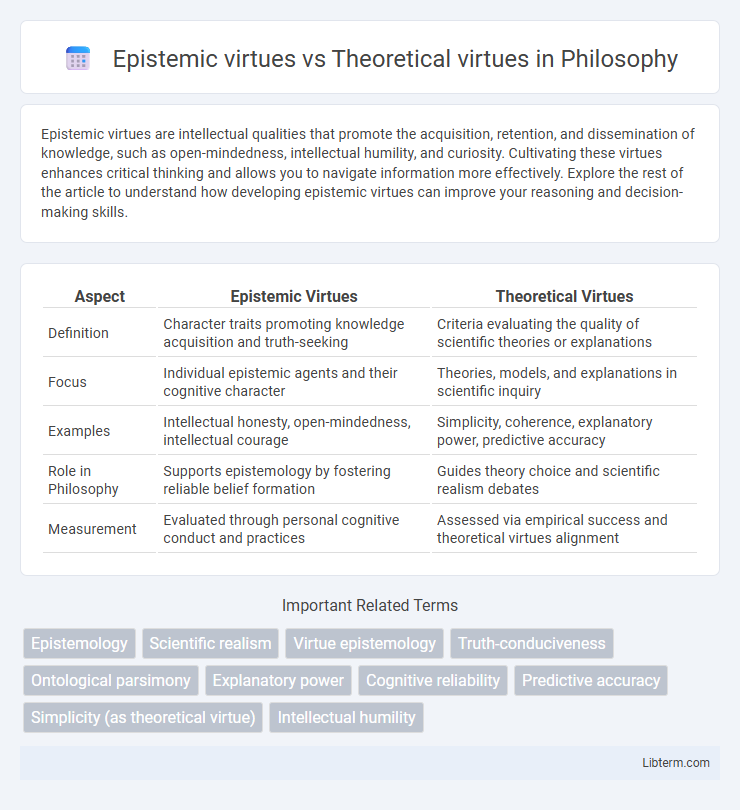Epistemic virtues are intellectual qualities that promote the acquisition, retention, and dissemination of knowledge, such as open-mindedness, intellectual humility, and curiosity. Cultivating these virtues enhances critical thinking and allows you to navigate information more effectively. Explore the rest of the article to understand how developing epistemic virtues can improve your reasoning and decision-making skills.
Table of Comparison
| Aspect | Epistemic Virtues | Theoretical Virtues |
|---|---|---|
| Definition | Character traits promoting knowledge acquisition and truth-seeking | Criteria evaluating the quality of scientific theories or explanations |
| Focus | Individual epistemic agents and their cognitive character | Theories, models, and explanations in scientific inquiry |
| Examples | Intellectual honesty, open-mindedness, intellectual courage | Simplicity, coherence, explanatory power, predictive accuracy |
| Role in Philosophy | Supports epistemology by fostering reliable belief formation | Guides theory choice and scientific realism debates |
| Measurement | Evaluated through personal cognitive conduct and practices | Assessed via empirical success and theoretical virtues alignment |
Introduction to Epistemic and Theoretical Virtues
Epistemic virtues are character traits that promote the acquisition and retention of knowledge, such as intellectual humility, open-mindedness, and intellectual courage, which enhance cognitive reliability and epistemic responsibility. Theoretical virtues, including simplicity, explanatory power, and coherence, serve as criteria for theory choice and guide the evaluation of scientific hypotheses and models. Understanding the distinction and interplay between epistemic virtues and theoretical virtues is crucial for advancing epistemology and scientific methodology.
Defining Epistemic Virtues
Epistemic virtues are character traits that promote intellectual virtues such as open-mindedness, intellectual humility, and perseverance, enhancing an individual's capacity to acquire and evaluate knowledge effectively. Unlike theoretical virtues, which are qualities attributed to scientific theories such as simplicity, explanatory power, and coherence, epistemic virtues emphasize the personal qualities and practices of thinkers that support the pursuit of truth. Defining epistemic virtues involves identifying habits and dispositions that foster reliable belief formation and critical thinking in epistemology.
Understanding Theoretical Virtues
Theoretical virtues are qualities that make scientific theories preferable, including simplicity, explanatory power, coherence, and scope, which guide the evaluation and selection of hypotheses. Understanding theoretical virtues involves recognizing how these criteria contribute to the reliability and predictive success of scientific models, fostering robust epistemic practices. Unlike epistemic virtues that emphasize intellectual character traits like open-mindedness and intellectual humility, theoretical virtues specifically assess the intrinsic attributes of theories themselves.
Historical Development of Virtues in Epistemology
The historical development of epistemic virtues and theoretical virtues reveals their distinct roles in epistemology, with epistemic virtues emphasizing character traits such as intellectual humility and open-mindedness, while theoretical virtues prioritize qualities like simplicity, coherence, and explanatory power in theory choice. Early philosophical traditions, including Aristotle's concept of intellectual virtues, laid the groundwork for epistemic virtues, whereas 20th-century philosophers like Karl Popper and Thomas Kuhn advanced theoretical virtues within the philosophy of science. This evolution highlights a shift from focusing on the epistemic agent's character to evaluating the merits of theories, reflecting the broader complexity in epistemological inquiry.
Key Differences Between Epistemic and Theoretical Virtues
Epistemic virtues prioritize intellectual qualities such as open-mindedness, intellectual humility, and intellectual courage, which facilitate effective knowledge acquisition and justification. Theoretical virtues emphasize attributes like simplicity, coherence, explanatory power, and predictive accuracy that guide theory choice and scientific reasoning. The key difference lies in epistemic virtues focusing on the character traits of knowers, while theoretical virtues concentrate on the evaluative criteria of scientific theories.
Overlaps and Intersections of Epistemic and Theoretical Virtues
Epistemic virtues such as intellectual humility, open-mindedness, and intellectual courage often intersect with theoretical virtues like simplicity, explanatory power, and coherence in scientific inquiry. Both sets of virtues promote rigorous knowledge acquisition by encouraging critical evaluation, consistency, and clarity in reasoning processes. The overlap emphasizes the importance of integrating moral and cognitive qualities to enhance both the justification and development of scientific theories.
Role of Epistemic Virtues in Knowledge Acquisition
Epistemic virtues, such as intellectual humility, open-mindedness, and intellectual courage, play a crucial role in knowledge acquisition by fostering critical thinking and enabling individuals to evaluate evidence impartially. Unlike theoretical virtues, which prioritize explanatory power, simplicity, and coherence in scientific theories, epistemic virtues emphasize the character traits that promote rigorous inquiry and the responsible use of cognitive resources. Cultivating these virtues enhances the reliability of belief formation and drives the progress of understanding by encouraging persistent questioning and reflective judgment.
Theoretical Virtues in Scientific Theory Choice
Theoretical virtues such as simplicity, explanatory power, predictive accuracy, and coherence play a crucial role in scientific theory choice by guiding scientists to prefer theories that better unify diverse phenomena and offer more testable predictions. These virtues function as heuristic criteria for evaluating competing scientific theories beyond mere empirical adequacy, facilitating progress toward more robust and comprehensive scientific explanations. Emphasizing theoretical virtues helps prioritize theories that not only fit observed data but also contribute to the systematic development of scientific knowledge.
Critiques and Limitations of Virtue-Based Approaches
Epistemic virtues, such as intellectual humility and open-mindedness, emphasize character traits that foster knowledge acquisition, while theoretical virtues like simplicity and explanatory power serve as criteria for evaluating competing theories. Critics argue that virtue-based approaches often suffer from subjectivity, lacking clear metrics to measure epistemic strengths reliably, which can lead to inconsistent application across different contexts. Moreover, these approaches face challenges in balancing individual character traits with communal epistemic norms, potentially limiting their effectiveness in collaborative scientific practices.
Conclusion: Implications for Philosophy and Science
Epistemic virtues such as intellectual humility and open-mindedness directly influence the reliability of knowledge acquisition, while theoretical virtues like simplicity and explanatory power guide the evaluation and acceptance of scientific theories. The interplay between these virtues shapes both philosophical inquiry and scientific methodology, promoting rigorous standards for truth and coherence. Recognizing their complementary roles enhances critical thinking, improves hypothesis formation, and fosters advancements in epistemology and the philosophy of science.
Epistemic virtues Infographic

 libterm.com
libterm.com